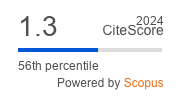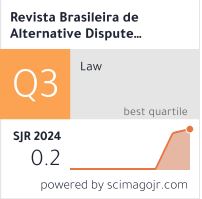Role of robot mediators in settling disputes
DOI:
https://doi.org/10.52028/rbadr.v7.i13.ART03.KAZKeywords:
Robot, Artificial intelligence, Mediation, Settling Conflicts, Legal RegulationAbstract
The article explores the function of robot mediators equipped with artificial intelligence in conflict resolution through a mixed-methods approach combining systematic literature analysis and comparative case studies. It thoroughly studies the key advantages of such systems: neutrality, ability to work with large amounts of data, scalability, and minimal impact of emotional factors. Special attention is paid to such technologies as machine learning, natural language processing (NLP), and using blockchain to increase safety. Important restrictions of robot mediators are also highlighted, including the lack of empathy, potential algorithmic bias, confidentiality issues, and legal uncertainty. The authors employ qualitative analysis of real-world mediation scenarios and quantitative evaluation of algorithmic performance to assess the feasibility of AI-driven solutions. The authors also consider the prospects of hybrid models, which combine artificial intelligence with human involvement, and touch upon ethical and regulatory challenges related to the globalization of mediation processes. The article highlights the need to balance technological efficiency and humanistic values, proposing various ways to integrate robot mediators into legal and social practice.
References
BEDI, Fahimeh, ZELEZNIKOW, John, BELLUCCI, Emilia. Universal standards for the concept of trust in online dispute resolution systems in e-commerce disputes. International Journal of Law and Information Technology, vol. 27, no. 3, pp. 209-237, 2019. https://doi.org/10.1093/ijlit/eaz005
ARANA-CATANIA, Miguel, VAN LIER, Felix-Anselm., PROCTER, Rob. Machine Learning for Mediation in Armed Conflicts. Zenodo Preprint, 2021. https://doi.org/10.5281/zenodo.5282693
BAKHTEEV, D. V., SOSNOVIKOVA, A. M., KAZENAS, E. V. Overcoming Illegal Cross-border Transfer of Personal Data. Journal of Digital Technologies and Law, vol. 2, no. 4, pp. 943-972, 2024. https://doi.org/10.21202/jdtl.2024.45
BAZAROV, Tahir Yu, CHINNOVA, Alesya S. Социально-психологические детерминанты эффективности медиации [Socio-Psychological Determinants of Mediation Effectiveness]. Психологические исследования [Psychological Studies], vol. 5, no. 23, pp. 40-52, 2012. (in Russian). https://doi.org/10.54359/ps.v5i23.769
BIRMINGHAM, Chris, HU, Zijian, MAHAJAN, Kartik, REBER, Eli, J, Maja. Can I Trust You? A User Study of Robot Mediation of a Support Group. 2020 IEEE International Conference on Robotics and Automation (ICRA), Paris, pp. 8019-8026, 2020. https://doi.org/10.1109/ICRA40945.2020.9196875 CHEN, Long, ZHANG, Wei, SONG, Yanqing, CHEN, Jianguo. Machine Learning for Human-Machine Systems with Advanced Persistent Threats. IEEE Transactions on Human-Machine Systems, vol. 54, no. 6, pp. 753–761, 2024. https://doi.org/10.1109/THMS.2024.3439625
CORNEJO, Ya. Neurorights and Personal Data: Challenges and Mental Autonomy. Journal of Digital Technologies and Law, vol. 2, no. 3, pp. 711-728, 2024. https://doi.org/10.21202/jdtl.2024.36
ERREIRA, D. B., GROMOVA E.A., TITOVA E.V. The Principle of a Trial Within a Reasonable Time and JustTech: Benefits and Risks, Human Rights Review, 25, 1. P. 47-56, 2024.
FERREIRA, D.B., SEVERO, L. Multiparty Mediation as Solution for Urban Conflicts: A Case Analysis from Brazil, BRICS Law Journal, 8(3), 5-29, 2021. https://doi.org/10.21684/2412-2343-2021-8-3-5-29
GARCIA, M. Racist in the Machine: The Disturbing Implications of Algorithmic Bias. World Policy Journal, vol. 33, no. 4, pp. 111-117, 2016.
GROMOVA, E.A., FERREIRA, D.B. Regulatory Sandbox: Bridging the Gaps by Designing a Dispute Resolution System. Conflict Resolution Quarterly, 2025. https://doi.org/10.1002/crq.21482
GROMOVA, E., FERREIRA, D. B. On the Way to BRICS+Digital Sovereignty: Opportunities and Challenges of a New Era, BRICS Law Journal, 11, 3, pp. 54-69, 2024. DOI: 10.21684/2412-2343-2024-11-3-54-69
IQBAL, A. S. M. Tariq. Alternative Dispute Resolution in commercial transactions: A comparative study between the UK and Bangladesh Jurisdiction. Revista Brasileira de Alternative Dispute Resolution – RBADR, Belo Horizonte, ano 06, n. 12, p. 207-222, jul./dez. 2024. DOI: 10.52028/
rbadr.v6.i12.ART10.BGL.RBADR12_MIOLO.indd
KATSH, Ethan, RABINOVICH-EINY, Orna. Digital Justice: Technology and the Internet of Disputes. Oxford: Oxford University Press, 2017. https://doi.org/10.1093/acprof:oso/9780190464585.001.0001
KELLONIEMI, Alisa R. Как использовать блокчейн для обеспечения безопасности данных [How to Use Blockchain for Data Security]. Международный научный журнал «Вестник науки» [International Scientific Journal “Science Bulletin”], vol. 5, no. 7 (64), pp. 206-210, 2023. (in
Russian).
KHARITONOVA, Yulia S., SAVINA, Viktoria S., PAGNINI, Fabrizio [KHARITONOVA, Yu.S. et al.]. Предвзятость алгоритмов искусственного интеллекта: вопросы этики и права [AI Algorithmic Bias: Ethical and Legal Issues]. Вестник Пермского университета. Юридические науки
[Perm University Herald. Juridical Sciences], no. 53, pp. 488-515, 2021. (in Russian). https://doi.org/10.17072/1995-4190-2021-53-488-515
LODDER, Arno R., ZELEZNIKOW, John. Enhanced Dispute Resolution Through the Use of Information Technology. Cambridge: Cambridge University Press, 2010. https://doi.org/10.1017/CBO9780511777554
LU, Jinwei, YAN, Yikuan, HUANG, Keman, YIN, Ming, ZHANG, Fang. Do We Learn from Each Other: Understanding the Human-AI Co-Learning Process Embedded in Human-AI Collaboration. Group Decision and Negotiation, 2024. https://doi.org/10.1007/s10726-024-09912-x
MAYER, John D., GASCHKE, Yvonne N. The Experience and Meta-Experience of Mood. Journal of Personality and Social Psychology, vol. 55, no. 1, pp. 102-111, 1988. https://doi.org/10.1037/0022-3514.55.1.102
MELLO, Celso de, PETTERS, Dean, PARTHEMORE, Joel, MOFFATT, David, BECKER-ASANO, Introduction to the Special Issue On Computational Modelling of Emotion. IEEE Transactions on Affective Computing, vol. 12, no. 2, pp. 277–278, 2021. https://doi.org/10.1109/TAFFC.2021.3073214
MOORE, Christopher W. The Mediation Process: Practical Strategies for Resolving Conflict. 4th ed. San Francisco: Jossey-Bass, 2014.
PETRENKO, Vyacheslav I., TEBUEVA, Fariza B., ANZOROV, Artur R., STRUCHKOV, Igor V. Метод защиты системы машинного обучения от вредоносных программ [A Method for Protecting a Machine Learning System from Malicious Programs]. Прикаспийский журнал: управление и высокие технологии [Caspian Journal: Management and High Technologies], no. 1 (57), pp. 113-126, 2022. (in Russian).
PIPERSKI, Alexander Ch. [PIPERSKI, A.Ch.]. Вежливость в коммуникации между человеком и искусственным интеллектом [Politeness in Human-AI Communication]. Слово.ру: Балтийский акцент [Slovo.Ru: Baltic Accent], vol. 15, no. 4, pp. 89-98, 2024. (in Russian). https://doi.
org/10.5922/2225-5346-2024-4-6
SALAMANCA, Andrés. Biased Mediators in Conflict Resolution. American Law and Economics Review, vol. 26, no. 1, pp. 45-67, 2024.
SAUNDERSON, Shane, NEJAT, Goldie. How Robots Influence Humans: A Survey of Nonverbal Communication in Social Human-Robot Interaction. International Journal of Social Robotics, vol. 11, pp. 575-608, 2019. https://doi.org/10.1007/s12369-019-00523-0
SHEN, Solace, SLOVAK, Petr, JUNG, Malte F. “Stop. I See a Conflict Happening.” A Robot Mediator for Young Children’s Interpersonal Conflict Resolution. Proceedings of the 2018 ACM/IEEE International Conference on Human-Robot Interaction, Chicago, pp. 1-8, 2018. https://doi.
org/10.1145/3171221.3171248
SOMA, Karthik, VARADHARAJAN, Vivek S., HAMANN, Heiko, BELTRAME, Giovanni. Congestion and Scalability in Robot Swarms: A Study on Collective Decision Making. arXiv Preprint, 2023. https://doi.org/10.48550/arXiv.2307.08568
SUSSKIND, Richard, SUSSKIND, Daniel. The Future of the Professions: How Technology Will Transform the Work of Human Experts. Oxford: Oxford University Press, 2015. https://doi.org/10.1093/oso/9780198713395.001.0001
TRESCAK, Tomas, SIERRA, Carles, SIMOFF, Simeon, MANTARAS, Ramon L. Dispute Resolution Using Argumentation-Based Mediation. CEUR Workshop Proceedings, vol. 1283, pp. 1-15, 2014.
XIE, Tianling, PENTINA, Iryna. Attachment Theory as a Framework to Understand Relationships with Social Chatbots: A Case Study of Replika. Proceedings of the 55th Hawaii International Conference on System Sciences, Maui, pp. 2046-2055, 2022.
Downloads
Published
Issue
Section
License

This work is licensed under a Creative Commons Attribution 4.0 International License.
No royalties or other compensation shall be due for the publication of the works.
The opinions expressed by the authors of the articles and reviews are their sole responsibility.









